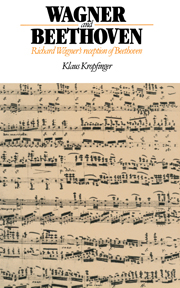Book contents
- Frontmatter
- Contents
- Preface
- Additional acknowledgements
- German and English abbreviations
- 1 Introduction
- 2 Wagner's experience of Beethoven
- 3 The Romantic background and Beethoven biography
- 4 Beethoven's role in Wagner's writings on art
- 5 Wagner's theory and construction of music drama
- 6 Wagner as Beethoven's heir
- Notes
- Bibliography
- Index of names
- Index of subjects
4 - Beethoven's role in Wagner's writings on art
Published online by Cambridge University Press: 21 May 2010
- Frontmatter
- Contents
- Preface
- Additional acknowledgements
- German and English abbreviations
- 1 Introduction
- 2 Wagner's experience of Beethoven
- 3 The Romantic background and Beethoven biography
- 4 Beethoven's role in Wagner's writings on art
- 5 Wagner's theory and construction of music drama
- 6 Wagner as Beethoven's heir
- Notes
- Bibliography
- Index of names
- Index of subjects
Summary
Wagner as a writer
The problematic nature of Wagner's writings
I am not talking about his theory. If it were not something so completely secondary, not so wholly a retrospective and superfluous glorification of his own talent, then his creative work would undoubtedly have become just as untenable as the theory: and nobody would have taken it seriously for a moment without the work, which appears to validate it as long as one is sitting in the theatre, but which in fact validates nothing but itself. Has anybody ever seriously believed in this theory, I wonder? … it is true enough: there is not much to be learned about Wagner from Wagner's critical writings.
(Pro and Contra Wagner, p. 47)Thomas Mann expressed the above views in 1911; later he would qualify them, as in ‘The Sorrows and Grandeur of Richard Wagner’ (1933), addressed above all to the theory of the Gesamtkunstwerk. What fascinated him all his life was the immediate artistic experience of Wagner's compositions, with their significance for his own creative work. The theorist in Wagner was suspect to the author in Mann. While his approach may have been a partial one, Mann still represents the critics of Wagner the theorist, the musical philosopher and aesthetician. Wagner has an undisputed place in a cultural tradition that we acknowledge and reproduce. But even today his theoretical statements are regarded with a certain amount of misgiving and prejudice.
- Type
- Chapter
- Information
- Wagner and BeethovenRichard Wagner's Reception of Beethoven, pp. 68 - 154Publisher: Cambridge University PressPrint publication year: 1991



